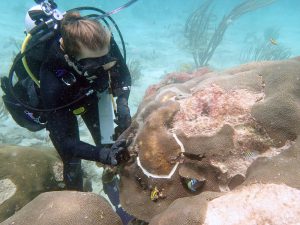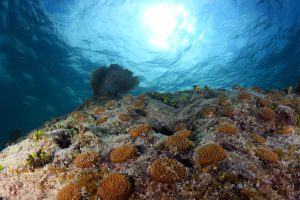
Since 2014, Florida’s Coral Reef has been fighting an outbreak of a communicable, waterborne disease called stony coral tissue loss disease (SCTLD).
Just released, the Stony Coral Tissue Loss Disease & Response on Florida’s Coral Reef: Winter 2023 Overview details the status of the reefs, the state of the disease and activities for research, response and reef recovery conducted to date. Co-authored by Florida Sea Grant and other lead organizations from the Florida Coral Disease Outbreak Response Communications Team, the report also offers hope for stony coral restoration and a call to action for communities.
“Florida’s Coral Reef is a national treasure with enormous economic, cultural and intrinsic value,” said Shelly Krueger, a Florida Sea Grant agent at UF/IFAS Extension Monroe County and co-author of the report. “It supports an amazing diversity of marine life and offers abundant ecosystem services to millions of residents and visitors. It also annually supports 71,000 full- and part-time jobs while generating $6.3 billion in combined local sales and income.”
Research, progress and outcomes reported in the document are the result of eight years of work conducted by a team of partners from federal, state and local government agencies, non-governmental organizations, universities, aquariums and members of the diving community. Partners have been researching the disease, developing and applying treatments, rescuing vulnerable and surviving corals, strategically restoring coral populations and much more.
Recorded as one of the most aggressive diseases in history, SCTLD has infected more than half of the 45 species of stony coral along Florida’s Coral Reef and the Caribbean.
“Although disease is a natural part of any ecosystem, SCTLD is arguably worse than any other recorded coral disease, due to the combination of its geographic range, longevity, number of species affected and high mortality rates,” said Krueger.

Researchers and partners agree that while the situation is urgent, there is still time to preserve and support the recovery of this vital ecosystem.
“Now that the disease has made its way across the entire reef tract, we are seeing less of the disease in southeast Florida and the Florida Keys, potentially due to the dramatic loss of susceptible species,” said Jennifer Stein, coral biologist at the state Fish and Wildlife Research Institute. “We are, however, seeing juveniles of these susceptible species within our surveys. These juveniles are evidence that some susceptible species can naturally repopulate, offering some hope for the reef tract.”
The full document, Stony Coral Tissue Loss Disease & Response on Florida’s Coral Reef: Winter 2023 Overview, is available on the Florida Sea Grant site. For more information on efforts to cope with the disease, visit the FDEP Stony Coral Tissue Loss Disease Response site.
#30
By Lourdes Mederos, rodriguezl@ufl.edu
ABOUT UF/IFAS
The mission of the University of Florida Institute of Food and Agricultural Sciences (UF/IFAS) is to develop knowledge relevant to agricultural, human and natural resources and to make that knowledge available to sustain and enhance the quality of human life. With more than a dozen research facilities, 67 county Extension offices, and award-winning students and faculty in the UF College of Agricultural and Life Sciences, UF/IFAS brings science-based solutions to the state’s agricultural and natural resources industries, and all Florida residents. ifas.ufl.edu | @UF_IFAS
The Florida Sea Grant program, hosted at UF/IFAS, is a university-based program that supports research, education and Extension to conserve coastal resources and enhance economic opportunities for the people of Florida. In addition to UF/IFAS, the program is a partnership between Florida universities, the National Oceanic and Atmospheric Administration and county governments.
flseagrant.org | @FloridaSeaGrant
Source: UF/IFAS Pest Alert
Note: All images and contents are the property of UF/IFAS.



